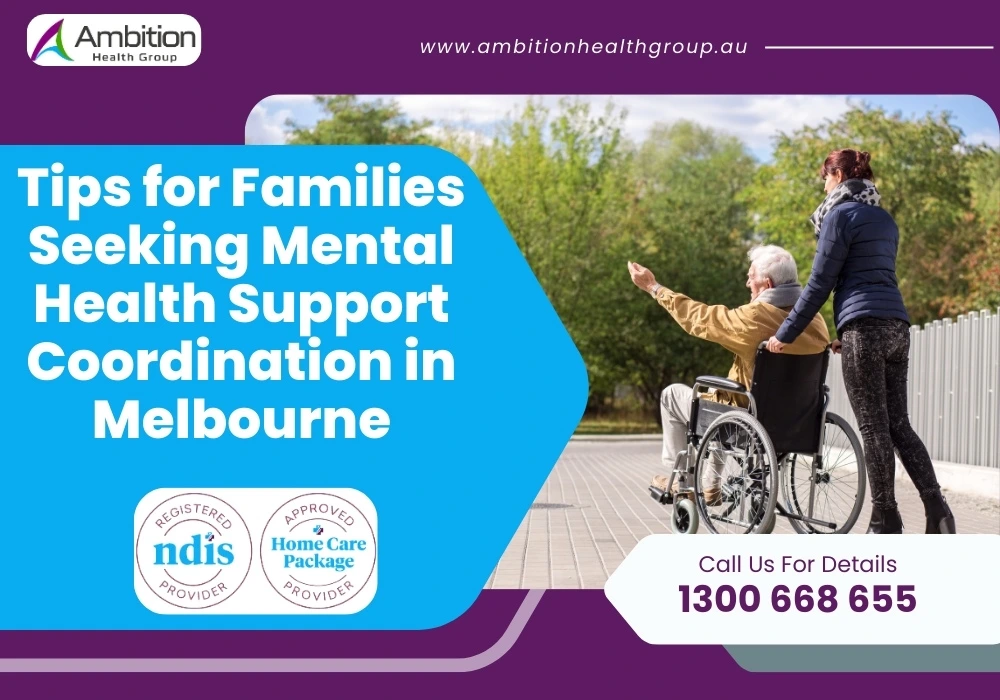Enquire about our SIL vacancies
Mental health is an essential aspect of our overall well-being, yet navigating the mental health care system can often feel overwhelming, especially for families dealing with complex situations. In Melbourne, families may face challenges in finding the proper mental health support and coordinating services that best fit their needs. However, with the proper guidance and resources, it’s possible to create a plan that helps families access the care they need in an efficient and supportive manner.
Steps for Families to Access Mental Health Support Coordination
Families seeking mental health support coordination Melbourne can access a range of services tailored to their needs. Here’s a step-by-step guide to help you navigate the available options:
1. Understand the Mental Health System
Before seeking support, it’s essential to familiarize yourself with the mental health system in Melbourne. The system can be complex, with various services available depending on the individual’s age, diagnosis, and personal circumstances. Both public and private providers offer services, and they may include mental health professionals such as psychologists, psychiatrists, social workers, and counsellors.
You may want to start by contacting local general practitioners (GPs) for a referral or looking into government-funded programs, including those offered through Medicare or the National Disability Insurance Scheme (NDIS) for eligible individuals.
2. Seek Assistance from a Mental Health Support Coordinator
A mental health support coordinator can help families navigate the complexities of mental health care, making it easier for them to find and access appropriate services. In Melbourne, support coordinators can be found within community health centres, NDIS-funded services, or private providers. These professionals are trained to assess individual and family needs, create personalised care plans, and connect families with the right specialists.
Support coordinators often act as a liaison between families and service providers, ensuring that all the necessary steps are taken to facilitate effective care. They can also assist with appointments and paperwork and advocate for the needs of the family member seeking help.
3. Consider the NDIS (National Disability Insurance Scheme)
For families dealing with mental health conditions that have a long-term or significant impact on daily life, the National Disability Insurance Scheme (NDIS) can be a vital resource. The NDIS provides funding for various services, including mental health support, and can assist with finding the right services to meet specific needs.
Families eligible for NDIS support can work with a mental health support coordinator who can assist with navigating the NDIS process and ensuring that all necessary services are covered. The NDIS can fund everything from therapy sessions and assessments to support workers and case management.
4. Research Local Services
Melbourne has a wide range of mental health services available to families. From specialist clinics and hospitals to community-based organizations, it’s crucial to research and identify the services that best meet your needs. You can begin by contacting organizations like the Royal Melbourne Hospital, Mind Australia, and the Melbourne City Mission, which offer tailored mental health support.
Some organizations specialize in child and adolescent mental health, while others focus on adult or family therapy. It is important to find providers who understand your needs and can collaborate with your family to design a comprehensive care plan.
5. Utilize Online Resources
Many families benefit from online resources that provide information on mental health services and support options in Melbourne. Websites such as Beyond Blue or Lifeline offer comprehensive listings of mental health services and resources available in Victoria. Additionally, these websites often provide valuable information about mental health conditions, treatment options, and practical steps for coping with mental health challenges.
Online resources also provide contact information for mental health hotlines, which can be a lifesaver in times of crisis. For families navigating mental health concerns, knowing where to turn in an emergency can make all the difference.
6. Build a Support Network
Caring for a loved one with mental health challenges can be emotionally taxing, which is why it’s essential to build a support network. This network can include family members, friends, mental health professionals, support groups, and community organizations. Many families find comfort in connecting with others who are facing similar experiences.
Support groups and forums dedicated to mental health can provide a sense of solidarity and help families exchange advice on finding services, managing care, and coping with the emotional aspects of caregiving. Several organizations in Melbourne, such as SANE Australia and Carers Victoria, offer these types of services.
7. Prioritize Self-Care
As a caregiver, your well-being is equally important as the person you are supporting. Mental health support coordination can sometimes feel like a full-time job, leaving caregivers feeling exhausted or overwhelmed. It’s essential to prioritize self-care and set aside time to focus on your own mental and physical health.
Families can consider seeking therapy or counselling, participating in stress-relief activities, and making time for activities that bring joy and relaxation. Many mental health support programs offer resources and counselling for family members as part of their holistic approach to care.
8. Ask for Recommendations
Word-of-mouth recommendations can be incredibly helpful when seeking mental health support. Consider asking trusted friends, family members, or colleagues for recommendations regarding services or providers they have worked with in the past. Often, personal experiences can give you insights into the quality of care, the type of support provided, and the overall approach of a particular service.
9. Know Your Rights
Families seeking mental health services in Melbourne should be aware of their rights under Australian law. Mental health services must operate in a way that is non-discriminatory and respects individual dignity and privacy. It’s important to know that you have the right to advocate for the best care and to seek a second opinion if you’re not satisfied with the services provided.
Additionally, many mental health services in Melbourne offer free or low-cost options to ensure accessibility, so don’t hesitate to inquire about these options if you’re concerned about affordability.
10. Stay Patient and Persistent
Lastly, seeking mental health support can take time. Families may experience waitlists, delays, or have to try multiple providers before finding the right fit. It’s important to remain patient, stay persistent, and continue advocating for the care your loved one needs. Remember that progress is often incremental, and there are many professionals in Melbourne committed to providing the best support possible.
Conclusion
Navigating the mental health support system can be challenging, but with the right resources and support coordination, families can create a care plan that provides long-term benefits. Whether you’re utilizing the NDIS, working with support coordinators, or simply seeking recommendations from trusted sources, there are many avenues for families in Melbourne to access comprehensive mental health care through Ambition Health Group.
By staying informed, proactive, and persistent, you can ensure that your family receives the mental health support it deserves.
Recent Posts
Top Rated Services
Get A Quick Quote Now
Enquire about our SDA vacancies
Enquiry Now
Consult Our Care Experts
Grab Your Free Consultation Today!
Or give us a call to speak to someone now
1300 668 655









